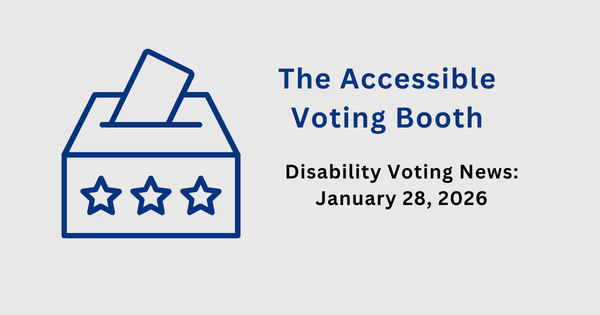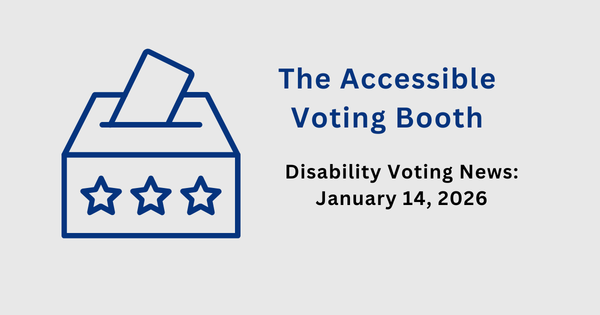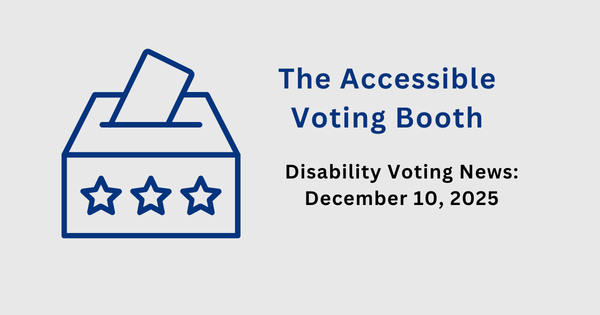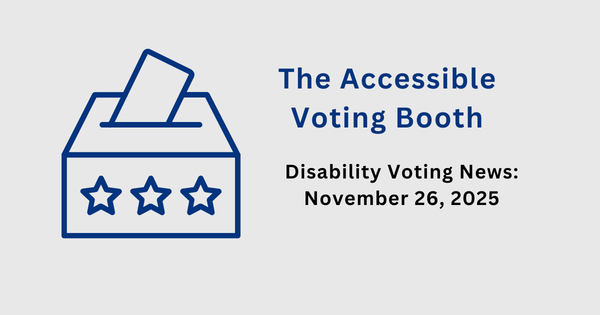Disability Voting News: October 22, 2025
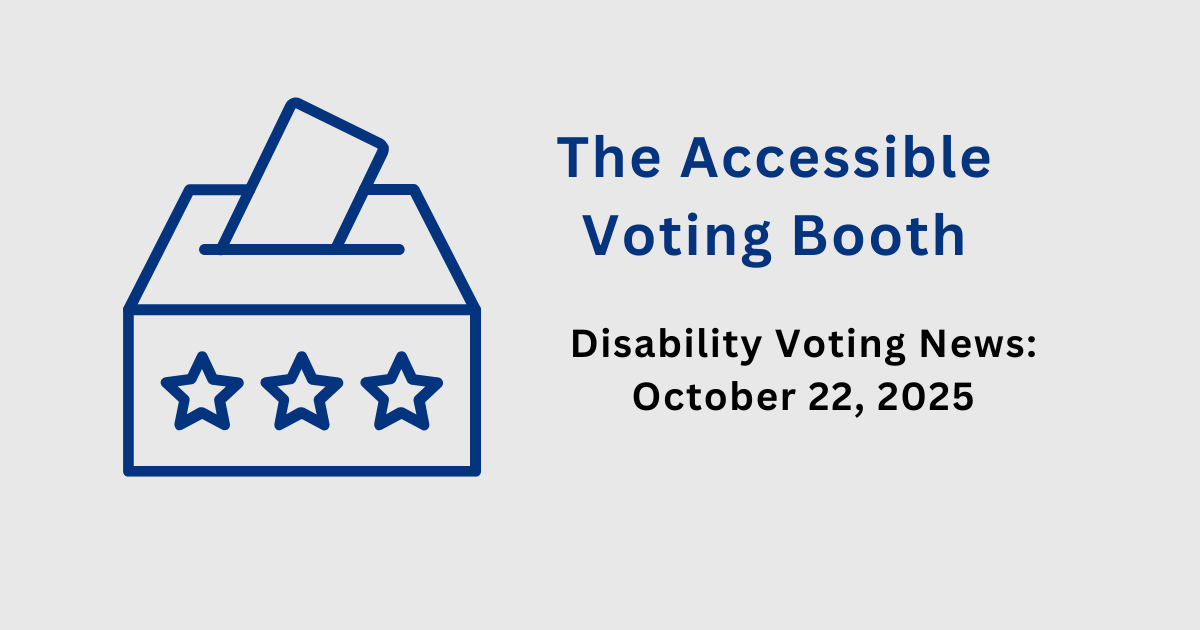
Welcome to the Accessible Voting Booth for October 22, 2025. This week, we’re going to focus on one of the largest threats to fair representation in decades: the challenge to Section 2 of the Voting Rights Act. Forgive me, as I’ll be on my soapbox today.
Note: the next issue of the Accessible Voting Booth will be my post-election analysis and roundup on November 12, in three weeks instead of the usual two.
Supreme Court hears arguments in case that could gut the Voting Rights Act (via ACLU).
The most consequential voting news of the past few weeks has been regarding the conclusion of arguments in Louisiana v. Callais in the Supreme Court, which was originally heard in March of this year and scheduled for reargument last Wednesday. Voting rights advocates are sounding the alarm around this case, as it could strip key provisions that ensure fair representation for Black voters.
Background on Louisiana v Callais
The story of this case starts in Louisiana in 2022, when the legislature passed a discriminatory congressional redistricting act, which was challenged in Robinson v. Landry by the Legal Defense Fund, other civil rights organizations, and individual voters. The plaintiffs argued “that the maps dilute the voting power of Black Louisianans by failing to provide Black voters an equal opportunity to elect their candidates of choice in a second Louisiana congressional district.” The Legal Defense Fund explains that while Black Louisianans made up a third of the state population, Black voters’ representation was limited to one out of six congressional districts under the 2022 maps, and Black voters from the two largest (and majority-Black) cities in Louisiana were packed into a single congressional district. The district court ruled and the Fifth Circuit held that this map violated Section 2 of the Voting Rights Act, which prohibits voting practices or procedures that “result in a denial or abridgement of the right of any citizen of the United States to vote on account of race or color.” In 2024, the Louisiana Legislature passed legislation (S.B. 8) with a new map that created a second majority-Black congressional district, and Robinson v. Landry didn’t advance to federal court.
Shortly after S.B. 8 was passed, a group of “non-African American voters” (so…white voters) challenged the new map in Louisiana v. Callais as a racial gerrymander that violates the Fourteenth and Fifteenth Amendments, two of the three Reconstruction Amendments written to give Black Americans equal protection under the law and voting rights. Now, they’re being weaponized by “non-African American” (again, white) voters to attempt to dilute the voting power of Black communities.
In April 2024, three federal court judges overturned the new map, arguing that legislators “improperly prioritized race,” but Black voters and civic organizations appealed the case and filed an Emergency Stay Application which allowed the new map to go into effect for the 2024 election. In March of this year, the Supreme Court heard oral arguments on the case. Then, the Supreme Court decided to schedule the case for reargument instead of making a decision in the Spring term, focusing on the overall constitutionality of Section 2 of the VRA and asking parties to submit additional briefs addressing the question of whether the intentional creation of a second majority-minority district violates the Fourteenth and Fifteenth Amendments. By focusing on the constitutionality of Section 2 of the VRA, the outcome of this case will not just impact Louisiana’s maps, but potentially impact representation for communities of color around the country. This decision has the potential to destroy the important protections of Section 2 of the Voting Rights Act.
Why This Matters
Section 2 of the VRA is a vital safeguard used to challenge racially discriminatory maps that have been drawn in favor of white voters for decades, starting with Jim Crow-era voting maps. It has been used to stop racial gerrymandering of 29 maps and electoral systems in the last decade. It ensures that minority communities don’t have their electoral power diluted and have a chance to elect the candidates of their choice. As we can see from Louisiana’s statistics, while Black voters make up a third of the population, they are racially gerrymandered to have their voting power confined to one sixth of the state’s Congressional representation. The “non-African American” (white) plaintiffs are using the very amendments that were created to protect the voting rights and equal protection of Black voters to argue that creating districts that allow for fair representation for minority voters is infringing upon their rights. They’re arguing that it’s racist (against white voters) to undo the racist gerrymandering Louisiana attempted in 2022.
Justice Kavanaugh, who is considered a key vote in this case, has stated “this court’s cases, in a variety of contexts, have said that race-based remedies are permissible for a period of time–sometimes for a long period of time, decades in some cases–but that they should not be indefinite, and should have an end point.” In the case of Section 2 of the Voting Rights Act, this so-called “end point” would presumably come after the eradication of racist gerrymandering and the end of racialized voter suppression.
But the nearly century-long Jim Crow era is not far in our past, and attempts to roll back voting rights and implement more voter suppression are only gearing up between Trump's mid-decade redistricting push, attempts to require documentary proof of citizenship, attempts to reduce or eliminate mail voting, and efforts to dismantle the Voting Rights Act. To imply that Section 2 of the Voting Rights Act is no longer necessary and that this country has stopped trying to disenfranchise Black voters is wrong. To be clear, those who attack civil rights have a political agenda of enacting and strengthening white supremacy. Racism has never gone away in this country, it has only ever transformed into new methods of oppression, from chattel slavery, to Jim Crow, to mass incarceration, to attacks on DEI, and to racialized voter suppression.
Opponents of Section 2 of the VRA (like White House Deputy Chief of Staff Stephen Miller) argue that it is a political tool that increases Democratic control of Congress, using language that shows their own partisan motivation for attacking the VRA. If Section 2 of the Voting Rights Act is overturned, Black Voters Matter and Fair Fight Action have estimated that the GOP’s hold over Congress could increase by 19 seats (and by up to 27 seats when tied to mid-decade redistricting). But what’s really at stake is the fair opportunity for communities of color to elect candidates representative of their communities. Section 2 remains a vital tool for fighting back against this country’s nonstop attempts to disenfranchise Black voters.
The Bottom Line
If the plaintiffs in this case truly cared about the spirit of the Fourteenth and Fifteenth Amendments, they would agree that the one third of Louisianans who are Black deserve fair representation: one third of Louisiana’s Congressional seats, two districts. Instead, they are weaponizing the very amendments that were created to give Black people citizenship to dismantle one of the key laws that was created to reverse the wrongs of Jim Crow. This is deeply racist and deeply evil, but also, unfortunately, completely expected by a country born of genocide, chattel slavery, and centuries of racist violence. We know that this racism never went away, it just found new ways to transform and endure. This is why we continue to need Section 2 of the Voting Rights Act.
As always, if you’d like to support the newsletter and my work, here’s how:
- Subscribe to the Accessible Voting Booth newsletter.
- Share this newsletter with your network to spread the word about disability voting rights.
- Leave me a tip. Thank you for supporting my work!

